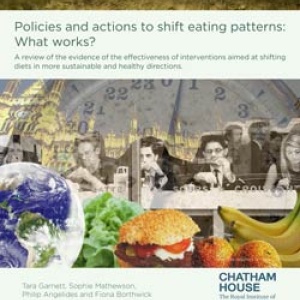
This literature review, undertaken by the Food Climate Research Network and Chatham House, and in association with EAT who also kindly supported the work, considers what the evidence has to say about effective ways of shifting people’s consumption patterns in more sustainable and healthy directions.
Having summarised the current state of knowledge on what sustainable healthy eating patterns look like, it focuses on four key eating practices that potentially offer win-wins for health and sustainability (while acknowledging qualifiers and caveats). These are 1. Increased consumption of plant based foods including fruit and vegetables; 2. Reduced meat consumption; 3. Shifts in palm oil consumption (i.e. not always or necessarily reductions); and 4. Reductions in sugar intakes. It also considers, 5. a fifth area where health and environmental goals diverge – the case of fish.
The review clusters interventions into the following categories as set out in the following table (see page 19 of the report) and uses this typology to structure the health and environmental evidence base and the research findings.

It finds, unsurprisingly, that while there is a vast health-oriented literature, food sustainability motivated interventions are much thinner on the ground. It also finds that research focusing on rich-world settings dominates – a huge omission since most of the growth in diet related diseases and food related environmental impacts is occurring in the developing world. And it finds that activities focusing on information and awareness raising and on individualised approaches dominate at the expense of more structural or systemic interventions. As to specific food types, there is a vast body of intervention activity focused on increasing fruit and vegetable consumption, and on limiting sugar, with far fewer interventions relating to the other target consumption practices under review (meat, palm oil, fish).
As to which interventions ‘work’ – the report’s headline conclusions are as follows:
Consumption matters: sustainable healthy diets should be a policy priority: A global shift towards more healthy and sustainable eating patterns is urgently needed. Policy makers and industry need to recognise the importance of this goal and prioritise efforts to advance it.
Don’t leave it to the individual: For too long the focus of interventions around health, and now sustainability, has been on the individual. This needs to change; approaches aimed at getting individuals to change voluntarily have limited impacts. The context of consumption also needs reshaping.
Don’t leave it to industry goodwill or enlightened self interest: While the food industry is taking positive steps to address some of the health and environmental problems it causes through its involvement in certification schemes and shared voluntary agreements, these measures alone are not enough. Government should provide a framework within which these voluntary initiatives operate.
Governments need to govern: There is a need for policy makers to set a strong regulatory and fiscal framework.
Schools are a promising context for intervention: School based interventions, show promising and positive results. There is now a need to move the agenda on by incorporating environmental considerations into the design and implementation of interventions.
Composite approaches are needed: No one approach will achieve the changes we need in the time we have. A mix of approaches – regulatory, fiscal, voluntary, and contextual and information oriented – is required.
Time, commitment and money needs to be invested in developing clear and consistent metrics and reporting processes: Interventions need to be underpinned by effective mechanisms for tracking and understanding their impacts. Equally there needs to be more consistency in establishing what outcomes are to be reported and measured and how.
Lack of evidence is not an excuse for inaction: action engenders evidence: Policy inaction leads to a paucity of empirical evidence. Trials and experimentation particularly based on some of the more politically challenging fiscal and regulatory approaches are essential.
A whole supply chain approach is needed to understand the environmental and health relationship, including trade- offs: While there are many overlaps between health and environmental goals there can be trade-offs too, particularly when a whole supply chain approach is considered. Thus production and consumption side measures, and the relationship between them, need to be understood and considered together and interventions designed with these in mind.
More research is (inevitably) needed: While underlining the importance of action now, clearly there are areas where further research is needed, and the report some key questions to pursue.
The full citation for the report is:
Garnett T, Mathewson S, Angelides P and Borthwick F (2015) Policies and actions to shift eating patterns: What works? A review of the evidence of the effectiveness of interventions aimed at shifting diets in more sustainable and healthy directions. Food Climate Research Network, University of Oxford.
Comments are welcomed and you can submit them in the comments field below the text. You will need to be logged in as a member to do so– use the email and password you used when you signed up. If you have forgotten your password please get in touch.



Post a new comment »